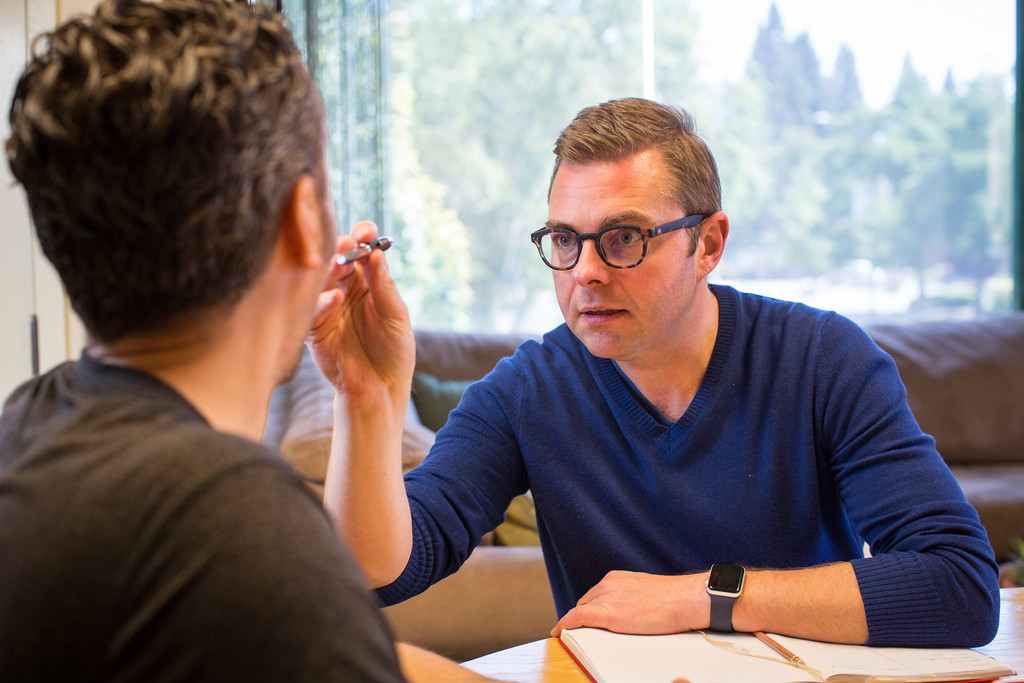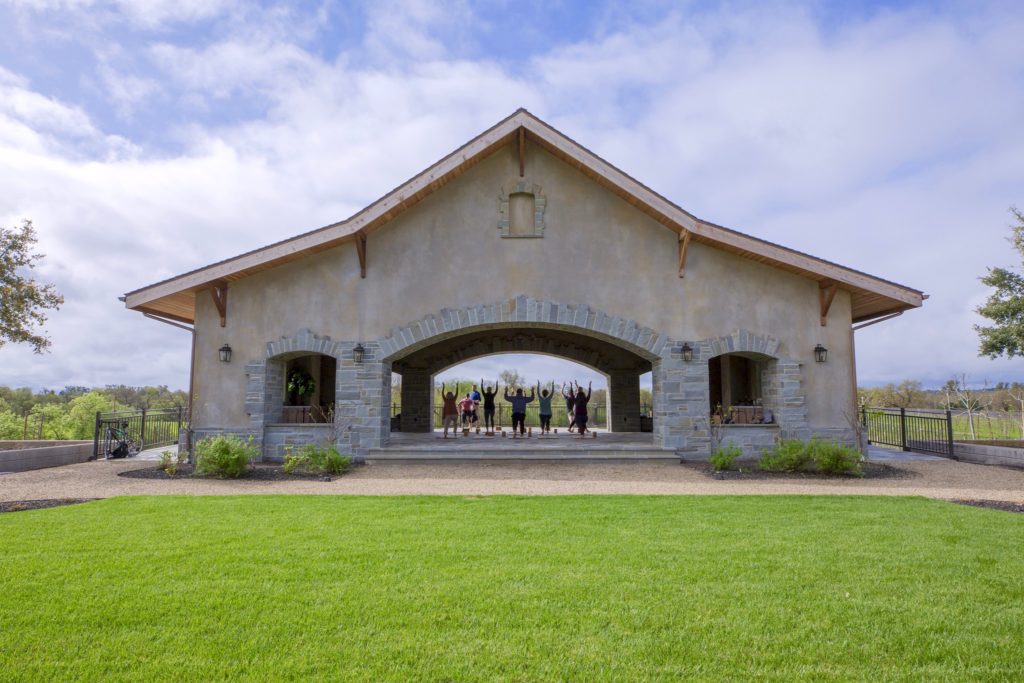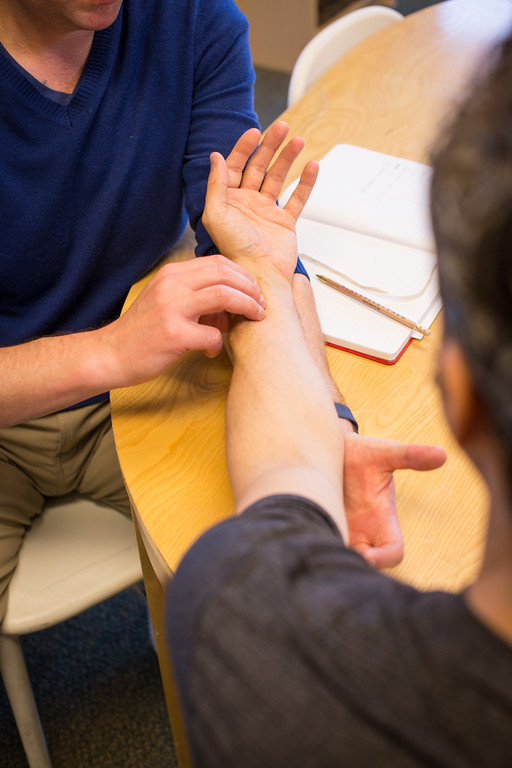It’s no secret that 2020 has been a tough year. What started as general concern about the novel coronavirus virus in late January has metastasized into stress and anxiety about the pandemic’s toll on our lives, health, economy and society. Now, as we near the end of 2020, we also look back on a year of political turmoil and social unrest and, in California, a series of wildfires that have further exacerbated fears about the faster pace of climate change and its implications for present and future generations.
Deacon Carpenter, a clinical Ayurvedic specialist and yoga teacher based in Healdsburg, is helping people navigate our present situation by adopting a holistic approach to mental and physical health. Carpenter is the author of “A Little Bit of Ayurveda: An Introduction to Ayurvedic Medicine” and is the founder of Well Sonoma in downtown Santa Rosa, a health center that uses integrative therapies, such as yoga, Ayurveda, naturopathic medicine, and craniosacral therapy, to promote well-being. These types of complementary and alternative approaches to medicine are rising in popularity — two separate 2015 studies indicated that about a third of Americans practice this type of care, and even healthcare juggernauts such as Kaiser Permanente now offer alternative approaches to medicine, such as acupuncture.
Sonoma Magazine and The Press Democrat contributor Matt Villano sat down (over Zoom) with Carpenter to get some tips on managing stress and improving mental health. Here is an edited transcript of that interview.
What makes you different from a psychologist?
With Ayurvedic medicine, we don’t look at symptoms that the patient is exhibiting, but instead we look at the whole patient. Part of the work that I do is talk therapy. It’s also lifestyle changes, diet and herbal therapies. If someone is struggling with anxiety, we do talk therapy but we also take a look at how they live and other things in their lives that are influencing their anxiety and we make wholesale changes rather than just prescribe medicine or therapy. It’s a much more holistic approach.
What are the benefits of a holistic approach to well-being?
The biggest benefit is focusing on cure rather than management. Our focus is to make the patient well from the ground up and also help them understand their own challenges and idiosyncrasies, what their triggers are and how to prevent them from being triggered further.
What piqued your interest in this area of well-being?
Personal experience. I struggled with weight for most of my younger life. When I was 16, I was 330 pounds. At my lowest weight I was 160 pounds. Right now I’m 190 pounds. For my height and body frame, that’s where I need to be. I’m now 47 and I’ve remained the same weight within 10 or 15 pounds since I was 16. It’s long-lasting. What I love about Ayurvedic medicine is that it gives the patient opportunity to be an active participant in their own health. Your learn how to fine-tune your own idiosyncrasies and your own imbalances so that you can prevent these imbalances from occurring.
How important is wellness right now?
Incredibly important. Most people have only a vague understanding of what ‘wellness’ is. I prefer the term, ‘well-being.’ That encompasses not just individual mindfulness and personal routines but also outward-facing activities, such as socializing and interacting with others, even if it’s at a distance. This all contributes to how we feel. If someone doesn’t understand what it feels like to be well, they’re not going to be able to do a good job at wellness. So we really need to break it down and find out what’s important to each of us as individuals, what we all need.
Generally speaking, what should we be valuing during this crazy time?
I was born in the UK, where the health conversation is all around prevention, and getting in front of a disease or imbalance. Here in the United States we tend to think of our health and well-being secondarily; things like work and family commitments come first. But you can’t pour from an empty cup. You have to be mindful of that. You must prioritize the whole being.
What’s the first step toward doing that?
Good habits. Ask yourself: What habits have you developed over the course of the last 8 months? What has changed for you? Do you have a routine? Have you been walking every day? Have you adopted bad habits? Have you ordered all the wine? Once you take a look at how you have managed stress, ask yourself how you can evolve those habits to make them more positive, so that they are better for your health and well-being. Ask yourself: Are you willing to evolve, edit, and adapt your lifestyle? The word, ‘change’ makes a lot of people run screaming for the hills, so we try to stay away from that word.
Why is change so scary for people?
It’s one of several words people have a hard time with. If I’m dispensing knowledge to you and I say, ‘You should change,’ that’s me imposing my will. I don’t live in your world. I don’t live in your body. For me to make that statement is arbitrary and punitive. How do you meet people where they are in their journeys and help them evolve? That’s the real question.
What’s the next step?
It’s important to talk to your social network. Connect with people whom you trust and ask them who they are seeing, and what has helped them. There are so many fabulous people in our county offering really great treatments: yoga therapy, talk therapy, and movement therapy, just to name a few. Ask for recommendations and you’ll be surprised how many you get.
After that, how do you know a practitioner is right for you?
So much of this is about finding the right person—someone who has a style that works for you. The best way to do that is to simply do your homework. Interview the person. Go to the practitioner’s website and read what the person is offering. My job is to be a quarterback for my clients. By the time they find me, they’re ready to evolve their habits and edit their lifestyle.
Finances are tight for a lot of people. What do you do if you can’t afford to pay for good therapy?
A lot of people who do what I do are happy to work with people who can’t afford rack-rate prices. We want to be able to provide services for everyone seeking them. When you want to see if a therapist is willing to negotiate on the rate, just ask. If you currently have limited income, state that in the beginning and you’ll find someone who will work with you.
What can people do privately to help manage stress?
Definitely keep a journal; journaling is very much underrated. When I start working with people I have them keep a food journal and they become more objective. Writing things down gives you the opportunity to reflect on situations. Writing it down and just ‘being with it’ can really help.
What mistakes do people commonly make on the wellness journey?
Most of the time, people think this is going to be a five-minute fix and that’s it. That’s a huge mistake. One of the conversations that we as practitioners are having now centers on the question ‘What were our clients dealing with before the pandemic that they’re now managing despite everything else?’ It’s an ongoing journey. The journey is the destination. We have to be in this for the long haul. This is about sustainable habits versus a quick shock change.
If you could tell people to remember one thing about managing stress, what would it be?
Don’t take it so seriously. Be light with your approach. Understand that you can only start where you are. When I started teaching yoga 8 or 9 years ago, I’d look at my students and they’d be looking around at each other. So I took all the mirrors out. We all have individual needs and individual physiologies and individual stories, and it’s important to understand what are the most important things for you. There’s no pass or fail. Having that perspective of being on your own path is important.













